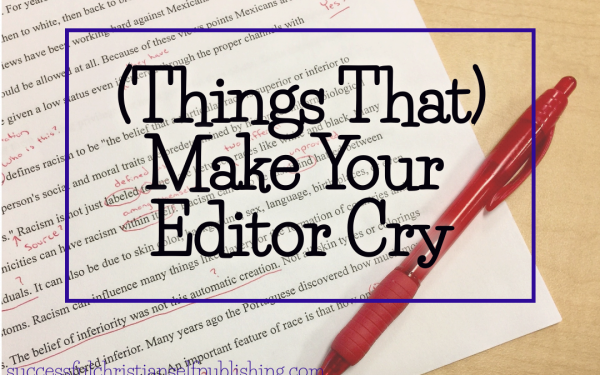Make Your Editor Cry: Anxious vs. Eager

If you use anxious to mean eager, most usage guides will disagree with you, at least slightly. On the other writers like Jane Austen, Kingsley Amis, Lord Byron, Flannery O’Connor, and several thousand others have used anxious exactly that way for hundreds of years. The Oxford English Dictionary even has citations for anxious as a synonym of sorts for eager dating to 1570, so for me that proves it has been used that way for almost 450 years, if not longer.
Here’s the debate.
Anxious means worried or uneasy. On the other hand, eager means full of keen desire.
Examples:
I'm anxious to see my ex-boyfriend.
I'm eager to see my ex-boyfriend.
I’m anxious for Christmas morning to come so
I can open my presents.
I’m eager for Christmas morning to come so I can open my presents.
To some, anxious has more of a negative connotation than eager.
You’re eager for your ex-boyfriend to arrive so you can make up and get back together with love and kisses and feels.
However, if he’s taking you to small claims court seeking restitution for all his belongings you burned in the front yard, then you’re more likely to feel anxious about his arrival because you’re dreading a confrontation and possible jail time. Since seeing an ex usually causes at least some anxiety—at least a few negative feelings—most people are likely to agree that anxious is the better word for that sentence.
Generally speaking, opening Christmas presents is a good thing, something you’d look forward to, something you’d be eager to have happen. Eager is a perfectly good word for that sentence—I’m eager for Christmas morning to come—but sometimes people use anxious there. As I said, most people use anxious interchangeably with eager, and style guides and even some dictionaries will grudgingly admit that’s fine most of the time. But anxious probably makes experienced readers think of anxiety which has to do with worrying, or being full of stress.
My recommendation: If there is any negativity, stick with anxious. If there isn’t, and if your intended contextual meaning is positive, use eager instead.

Gregg Bridgeman is the Editor-in-Chief at Olivia Kimbrell Press. He is husband to best-selling Christian author Hallee Bridgeman and parent to three. He continues to proudly serve in the US Armed Forces and has done so in either an active or reserve capacity for more than twenty years as an airborne and air assault qualified paratrooper, earning a Bronze Star for his service. Most importantly, he was ordained in October of 2001 after surrendering his life to Christ decades earlier.

